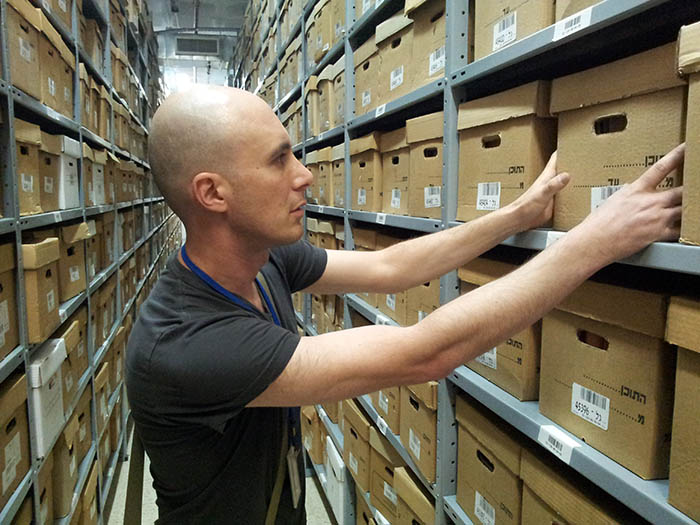Former Israeli general moves to silence independent journalist David Sheen
[vc_row][vc_column][vc_column_text]

David Sheen at Israel’s State Archives in Jerusalem (Credit: Rotem Malenky)
Israeli-Canadian journalist David Sheen, a former editor at Haaretz who regularly reports on racism against Africans within Israel, is the subject of a defamation lawsuit by former Israeli general Israel Ziv demanding $200,000. The case falls under what is known as a strategic lawsuit against public participation – or SLAPP.
“Ziv claims that I have defamed him by reporting on his activities and by referring to him in my tweets as an ‘arch-racist’, a ‘racist ringleader’, and a ‘war crimes whitewasher,’” Sheen said in an email to Index. “I contend that these are my opinions and that they are based on reported facts.”
In January 2017, Sheen wrote an article for the Electronic Intifada, an independent news website focusing on Palestine, entitled Netanyahu Openly Boasts of Israel’s War on Africans, in which he refers to Ziv as one of ten Israeli “ringleaders in Israel’s war on Africans”.
The mentions of Ziv in Sheen’s article refer to an investigation by Israel’s Channel 2 TV in 2016 that made public conversations between Ziv, now the owner of security consultancy company Global CST, and his associates during which they discussed a campaign with the objective to “whitewash the reputation” of the “cruel president” of South Sudan, Salva Kiir, “and to fortify his regime”. This followed a report by the United Nations that Kiir had allowed soldiers under his command to commit “a multitude of horrendous human rights violations,” including raping women and children en masse “in lieu of wages”. Ideas floated during Ziv’s meeting include that Kiir could blame these crimes on indigenous African tribal culture or that he could make a speech at the UN flanked by the victims.
Channel 2 TV and other news organisations that reported on this story are not facing legal action from Ziv, but Sheen, an independent journalist, is.
“While large news organisations employ teams of lawyers who can fend off SLAPP suits and legal harassment, independent journalists such as myself don’t, so we present a tempting target,” Sheen told Index. “But more than this: the mainstream media reports of Ziv’s efforts to aid the president of South Sudan were in the Hebrew language, which is only spoken by 0.1% of the world population.”
Sheen’s report was in English, the third most-spoken language in the world. “So even though my report was published by a small independent outlet, it has the potential of being read by many more people, and that is something that Ziv clearly wishes to prevent,” he said.
Sheen added that, in general terms, reporting on Israeli mistreatment of Africans is sometimes met with more resistance than reporting on Israeli mistreatment of Palestinians. “There is already a well-established ‘both sides’ narrative that can be utilised to try to explain away the latter. Israel’s defenders can say that Jews and Arabs have been battling for a hundred years, so Israeli mistreatment of Palestinians is just another round of tit for tat fighting.” he said. “They can’t use this narrative in regards to Israeli mistreatment of Africans because there is no recent – or ancient – history of conflict between Jews and African peoples. Unable to neuter criticism of the maltreatment of Africans, Israel’s defenders hope to silence reports about it.”
Sheen added that the libel lawsuit against him sends a clear warning to his fellow journalists that “in Israel, free speech is far from free, and powerful people can make critical speech extremely expensive for you, so don’t do it”.
“The case against David Sheen appears to be politically motivated,” said Melody Patry, head of advocacy at Index on Censorship. “No journalist should be prosecuted for exercising their freedom of speech.”
In recent years a number of lawsuits, many successful, have been made against journalists by officials in Israel, including a $464,000 2016 libel case against reporter Sharon Shpurer for a Facebook post disparaging an Israeli developer who is a convicted human trafficker. In July 2017, a journalist who claimed Prime Minister Benjamin Netanyahu was kicked out of his car by his wife was ordered to pay $32,500 in damages to the couple for libel.
“As it is, most Israeli media outlets serve as semi-stenographers of the Israeli army, repeating its press releases as though they were objective fact,” Sheen told Index. “The additional danger of crippling legal fees and fines will further disincentivise telling truth to power and leave Israeli society with increasingly impoverished fourth and fifth estates. Obviously, those who will suffer most as a result will be the country’s oppressed populations.”
In August 2017, the Israeli government announced proposals to ban Al Jazeera from operating in the country, echoing similar moves by Saudi Arabia and others who demanded that Qatar shutter the network and other media outlets as part of a list of demands to end a diplomatic crisis. The Israeli Government Press Office seemed intent on revoking the press credentials of Al Jazeera reporter Elias Karram but decided against this on 30 August. However, this was only after Karram provided a statement saying he does not support terrorism. The head of the GPO has said the body will “keep track of the network’s reports in Israel, in Arabic and in English, and will not hesitate to reach the necessary conclusions after consulting with legal and security officials”.
“Without question, freedom of the press is steadily decreasing in Israel,” Sheen told Index. “Sadly, many Israeli citizens seem to support it: in a 2015 article I wrote for Alternet, I noted that nearly half of Israelis believe that harsh public criticism of the government should be against the law.”
During a pre-trial session on 18 September, the dates for the case against Sheen will be set.
Supporters of Sheen have set up a petition to support the journalist.[/vc_column_text][/vc_column][/vc_row][vc_row][vc_column][vc_basic_grid post_type=”post” max_items=”4″ element_width=”6″ grid_id=”vc_gid:1504615911945-5d3d3e69-6e05-2″ taxonomies=”180, 449″][/vc_column][/vc_row]
